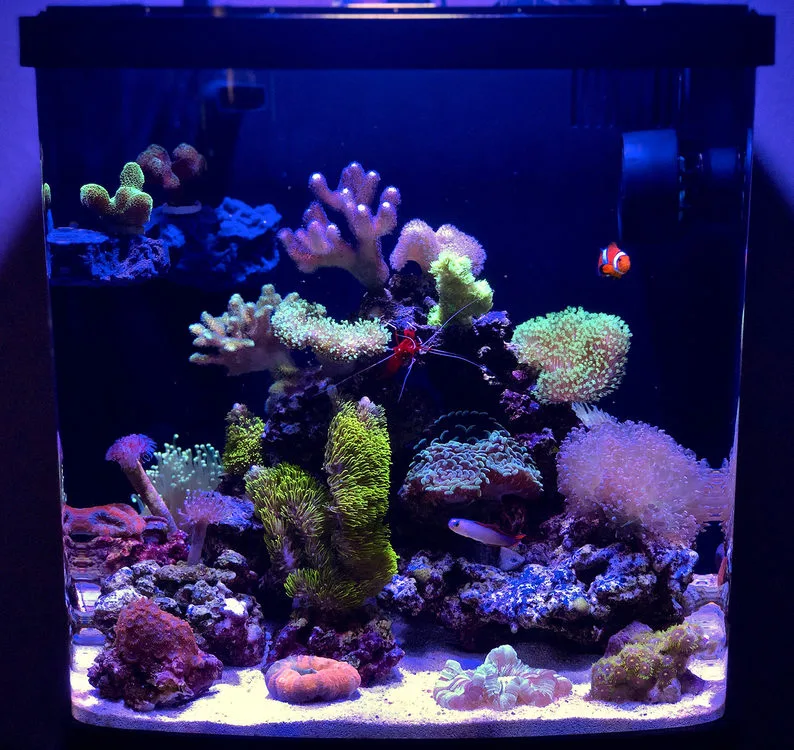Stunning 16-Gallon Reef Tank – Krish87's TOTM | NanoReef

Tank Specifications
Volume: 16 Gallons / 60 Liters
Dimensions (L × W × H):
15.0" ×
16.8" ×
17.5"
38.1cm ×
42.5cm ×
44.5cm
Equipment List
- Salt: CaribSea
Frequently Asked Questions
What is my weekly maintenance routine for the reef tank?
For weekly maintenance, I change the filter floss every 3-5 days based on its condition. I also clean any film algae off the glass every 3 days, blow off detritus using the AI Nero 5 powerhead, and check the ATO reservoir and pump functionality every 3 days. The ATO reservoir lasts about 3 to 4 weeks.
What tasks are included in my bi-weekly maintenance?
Every other Sunday, I perform a 3.5-gallon water change, which helps maintain stability and promotes coral growth without shocking the inhabitants. Additionally, I check for detritus and other unwanted build-up in the sump area and address any urgent issues.
What should I do during quarterly maintenance?
Quarterly maintenance includes a thorough cleaning of the sump area, swapping the return pump with a backup, cleaning the media basket and replacing media, cleaning the circulation powerhead, and cleaning the protein skimmer.
How often do I feed my fish and invertebrates?
I follow a controlled feeding regimen where I feed my fish and shrimp every other day. Their diet includes a mix of flakes, pellets, frozen mysis, and/or reef frenzy. For corals, I use Polyplab Reefroids every weekend and supplement them with Seachem Reef Plus weekly.
What are the key water parameters I should monitor?
The key water parameters to monitor in my reef tank include calcium (Ca) levels between 420 – 440 ppm, alkalinity (Alk) ranging from 7.8 – 8.2 dKH, magnesium (Mg) levels between 1275 – 1325 ppm, and a salinity of 1.025.
Should I dose my tank? If so, how do I determine when to do it?
You should only dose if you test first. Learn your water chemistry and maintain the levels that suit your corals and livestock. I do not dose unless my tests indicate that my levels have dropped significantly. I use Seachem Two-Part Reef Fusion to stabilize the chemistry when necessary.
What type of filtration setup is used in the tank?
The filtration system consists of an InTank Media Basket within the BioCube sump. In the media basket, I use double-bonded filter floss in the top section, Seachem Purigen in the second section, and Chemipure Elite in the lowest section.
What lighting do I use for my coral and how do I set it up?
I use an AI Prime HD light, which provides excellent support for my corals. My lighting schedule is based on David Saxby's recommended settings but tailored to meet my specific needs.
What should I do if I encounter pests in my tank?
Encountering pests like diatoms, aiptasia, or flatworms can be common. The best approach is not to panic; assess the situation and take the appropriate measures such as researching treatment options or seeking community advice.
How can I improve my reef tank's health and stability?
Regular water changes are crucial for health and stability in a reef tank. Additionally, maintaining consistent parameters and avoiding overfeeding are important. A RODI unit for water changes, a TDS meter for checking water quality, and a well-maintained cleanup crew can significantly help improve overall tank health.